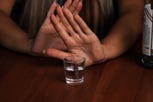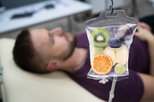Alcohol is the most commonly used addictive substance in the United States, with one in every 12 adults suffering from alcohol abuse or dependence. Alcohol detox is the process by which the body rids itself of alcohol in the system, and is an important first step towards treatment and recovery. How you detox from alcohol should always be medically supervised in order to ensure a safe alcohol withdrawal or detoxification process.
Types of Alcohol Detox Centers
There are different types of detox treatments available. The main types for alcohol addiction are:
Hospital Detox
A hospital detox program is usually located in a specific section of the hospital or on a certain floor. The program is often incorporated with other mental health services that the hospital provides. The detox unit is monitored closely by medical staff to ensure the safety of the addicts while they are undergoing detox. Hospital detox programs almost always implement a 12 step program into their plan and require that the patient attends 12 step meetings during his or her detox stay.
|
Pros |
|
|
Cons |
|
Outpatient Facility
Patients who attend an outpatient detoxification treatment are usually expected to travel to a hospital or treatment facility for daily treatment sessions (excluding weekends). Sessions can be scheduled in the daytime or evening, depending on the program hours. Upon arrival, patient will receive an initial assessment that goes over their alcohol history. The individual will also receive a physical examination and mental evaluation. This usually takes 1 to 2 hours on the first day of outpatient detox. The total duration of an alcohol outpatient detox program may range from 3 to 14 days.
|
Pros |
|
|
Cons |
|
Inpatient Facility
Patients who attend an inpatient detox facility reside there for their duration of treatment, which may range from 5 to 14 days.
|
Pros |
|
|
Cons |
|
Medically Assisted Treatment
Medically assisted detox is a treatment program that utilizes prescription medication to prevent, or lessen the symptoms of alcohol withdrawal. Because this type of treatment involves the administration of prescription drugs, it requires the supervision and participation of a medical professional, doctor or nurse practitioner.
There are different types of medications that are used to treat alcohol withdrawal. These are the most common ones.
Benzodiazepines: One of the most evidence-based medications; proven to reduce the risk of severe alcohol withdrawals like seizures or DT. Librium is a popular prescription to treat alcohol withdrawal syndrome because it has a lower addictive potential and lasts longer than other benzodiazepines.
Anticonvulsants: Has lower chances of dependence or abuse potential and may be used to treat mild withdrawal states. However, they may not be able to properly preventing seizures or DT in alcohol withdrawal states and is not recommended for cases of severe withdrawal.
Lorazepam: Often given to patients with seizures in the withdrawal period and those with past history of withdrawal seizure.
Chlorpromazine or risperidone: Low doses may be given to control severe agitation due to hallucinations. In most cases of late-stage withdrawal, hallucinations last about a week.
Multi-vitamin supplements: Vitamins B1, B2, B3, B6 and C may all be recommended for the initial 3-5 days of detox in order to treat chronic malnutrition and gastric malabsorption.
Cost of Detox
Finding an outpatient alcohol detoxification center near you is usually considerably less costly than going to a local inpatient facility. In a 2011 study conducted by Open Minds Consulting, the average price for 24 hours of inpatient medical detox was $1707.00 per day. The higher cost of an inpatient detox near you may reflect the level of alcohol withdrawal severity and co-occurring medical problems.
Note: Insurance may offset a large portion or the entire treatment expense, and many facilities will offer services on a sliding scale based on a person’s income and ability to pay.
What Happens in Detox?
Detox from alcohol involves the treatment of acute withdrawal symptoms, which may range from mild to severe, depending on how severe and long-standing a patient’s addiction is.
The symptoms of alcohol withdrawal generally appear within hours of ending or even lowering alcohol intake. The most common symptoms include the following:
- Tremors
- Cravings
- Nightmares, insomnia
- Anxiety, depression, or irritability
- Loss of appetite
- Nausea, vomiting
- Spikes in heart rate and blood pressure.
- Headache
- Sweating
Even without treatment, most of these manifestations will usually resolve several hours to several days after their appearance. However, more severe symptoms of alcohol withdrawal include the following manifestations:
- Hallucinations
- Seizures
- Delirium Tremens (DTs)
DTs, which last up to 3 or 4 days, are characterized by disorientation and are usually accompanied by severe agitation, rapid heartbeat, high blood pressure, and fever. It can develop between 1 and 4 days after the onset of withdrawal and are generally preceded by additional autonomic signs, such as sweating and tremors. Alcohol withdrawal delirium has a high mortality of about 8 percent, which is why it is so important for clinicians to be able to predict it.
The length of alcohol detox is different for everyone, but typically most acute alcohol withdrawal symptoms fade away after 5 days. If serious symptoms still persist for a week or longer, they should continue to be medically managed by a medical professional.
The Transition After Detox
The last part of detox is known as the post detox stage. According to the National Institute on Drug Abuse (NIDA), entering into an addiction treatment program of 3 months or more after detox is the best way to prevent a relapse. There, patients work with addiction professionals to get to the underlying issues of their addiction and learn tools on how to live a life without drinking or using substances. A detox program is the critical first step substance addiction recovery. Learn more about how inpatient and outpatient treatment programs can help you solidify your commitment to a sober life.
Recovery happens in stages. Detox is only the beginning of a healing process that can last a lifetime.
|
If you or someone you know is seeking help from addiction, please visit our directory of treatment centers or call 800-891-8171 to speak to a treatment specialist. |








